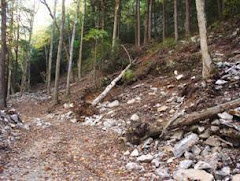Sunday, May 3, 2009 , 12:00 a.m.
By: Pam Sohn
Chattanooga Times Free Press
http://www.timesfreepress.com/news/2009/may/03/rock-mining-legislation-falls-short-some-say/
Tennessee legislation intended to protect state-owned property from rock miners is winning limited praise, and many want to know why it doesn’t apply to private landowners.
“I’m glad to see they’re getting what they’ve got. It will help the Cumberland Trail. The only problem is it doesn’t go far enough to protect the private landowner,” said Barbara Levi, a former Save Our Cumberland Mountains president and longtime member.
Tennessee Department of Environment and Conservation spokeswoman Tisha Calabrese-Benton said the bill, now on its way to Gov. Phil Bredesen for his signature, requires rock harvesters to get a permit and post a bond before rock harvesting on state property.
Before the legislation, the state’s only regulatory authority over rock mining was through water pollution permits.
“We believe this is a good step in protecting the taxpayers’ investment in state-owned land from the effects of rock harvesting,” she said.
John Savage, a landowner in Grundy County, fears the new legislation could be detrimental to private landowners.
“One possible outcome for this bill will be that rock mining operations will turn their attention away from state-owned lands to privately held lands,” he said. “This would not be a desirable outcome.”
Last year, a similar administration bill that did protect private lands was defeated when rock mining interests swamped lawmakers with complaints.
Representatives of the rock mining industry could not be reached for comment Friday.
After the new bill passed last week, Rep. Richard Floyd, R-Chattanooga, said he hopes to bring legislation that will provide similar protections for private landowners.
Prompted by the rock-mining destruction several years ago of about 100 yards of the Cumberland Trail, the Bredesen administration-drafted measure redefines “mineral” to include stone when it is located on state land. Rock miners must obtain a permit and post a bond assuring they will repair damage before they can begin mining on state property, according to the bill.
Rock mining, a form of strip mining to obtain Tennessee mountain stone now popular throughout the country for home building and landscaping, has become a point of debate in the Cumberland Plateau region.
In the early age of timbering and of coal mining in the Appalachians, many poor land owners sold those rights. When the property was sold the mineral rights could not be conveyed with it, so many landowners don’t own the mineral rights to their land. Rock miners have used mineral rights to obtain the stone.
“For someone to be able to come in on your land and remove rock is not right,” Mrs. Levi said. “When these laws were written about mineral rights 200 years ago, they were talking strictly about coal and oil.”
Thursday, May 28, 2009
Subscribe to:
Comments (Atom)

